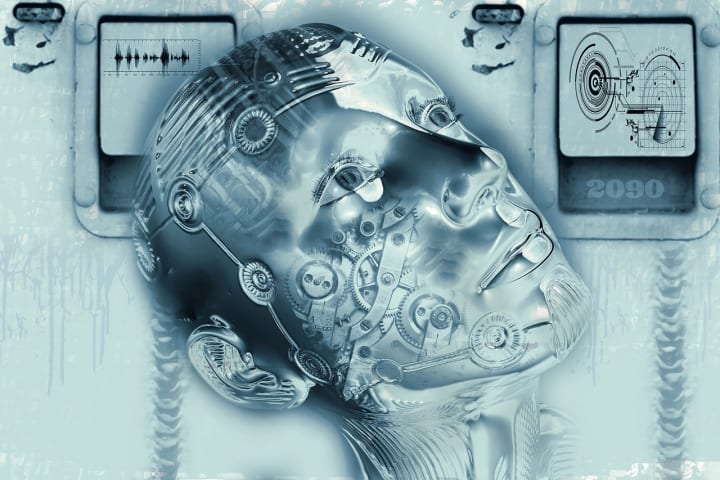Artificial Intelligence (AI)
Artificial Intelligence: The Future is Here

Imagine a world where machines can understand and respond to human emotions, where robots can perform complex surgeries with greater precision than human hands, and where self-driving cars navigate roads with zero accidents. This may sound like the stuff of science fiction, but the truth is that we are rapidly moving towards a future where artificial intelligence (AI) will play a major role in our daily lives.
AI is a branch of computer science that deals with the creation of intelligent machines that can think and work like humans. It involves the development of algorithms and computer programs that enable machines to learn from experience, improve their performance over time, and perform tasks that would otherwise require human intelligence.
One of the most exciting applications of AI is in the field of robotics. Robots equipped with AI algorithms can perform complex tasks with greater efficiency and accuracy than humans, and they can work in environments that are too hazardous for humans, such as disaster zones or deep-sea oil rigs. For example, Boston Dynamics, a leading robotics company, has developed robots that can perform a wide range of tasks, from performing backflips to carrying heavy loads.

Another exciting application of AI is in the field of healthcare. AI algorithms can be used to analyze medical images, such as X-rays and MRI scans, to detect diseases and conditions with greater accuracy than human doctors. This could lead to earlier diagnoses, more effective treatments, and better outcomes for patients. For example, an AI algorithm developed by Google Health has been shown to detect breast cancer with greater accuracy than human radiologists.
AI is also being used to revolutionize the way we drive. Self-driving cars equipped with AI algorithms can navigate roads, avoid obstacles, and make decisions based on real-time data, making driving safer and more efficient. This technology has the potential to reduce the number of road accidents, improve traffic flow, and provide mobility to people who are unable to drive.

However, the rapid advancement of AI also raises important ethical and social questions. For example, as AI continues to automate many tasks that were once performed by humans, there is a fear that it could lead to widespread job losses and increased inequality. There are also concerns about the potential for AI to be used for malicious purposes, such as the development of autonomous weapons.
To ensure that AI is developed and used responsibly, it is important for governments and organizations to establish ethical guidelines and regulations. This includes ensuring that AI algorithms are transparent, fair, and unbiased, and protecting the privacy and security of personal data.
Certainly, the applications of AI are virtually limitless, and its potential for transformation is only beginning to be realized. In the field of finance, AI algorithms are being used to detect fraud and make investment decisions with greater accuracy. In the field of retail, AI algorithms are being used to personalize shopping experiences, provide real-time recommendations, and improve supply chain management.
In the field of education, AI algorithms are being used to provide personalized learning experiences and assess student performance. For example, AI-powered tutoring systems can adapt to the learning style and pace of individual students, providing them with personalized feedback and support.
AI is also being used to tackle some of the world's biggest problems, such as climate change and global poverty. For example, AI algorithms can be used to analyze vast amounts of data and identify patterns in the global climate, helping scientists to better understand and mitigate the effects of climate change. AI can also be used to improve access to healthcare, education, and financial services in developing countries, helping to reduce poverty and improve quality of life.
However, despite its many benefits, the development of AI also raises serious concerns about accountability, ethics, and social responsibility. For example, as AI algorithms become more complex and autonomous, it may be difficult to determine who is responsible if they make mistakes or cause harm. There are also concerns about the potential for AI to perpetuate and amplify existing biases in society, leading to discriminatory outcomes.
To address these concerns, it is important for governments, organizations, and individuals to work together to establish ethical guidelines and regulations for the development and use of AI. This includes ensuring that AI algorithms are transparent, fair, and unbiased, and that the privacy and security of personal data are protected. It also means investing in education and training programs to ensure that workers have the skills and knowledge needed to succeed in a rapidly changing job market.
In conclusion, AI is one of the most exciting and rapidly evolving fields of technology today. It has the potential to transform many aspects of our lives, from healthcare and education to transportation and retail. However, it is important to approach the development and use of AI with caution and responsibility, ensuring that it is used ethically and for the benefit of humanity. By working together, we can ensure that AI becomes a powerful tool for positive change in the world.
About the Creator
Enjoyed the story? Support the Creator.
Subscribe for free to receive all their stories in your feed. You could also pledge your support or give them a one-off tip, letting them know you appreciate their work.






Comments
There are no comments for this story
Be the first to respond and start the conversation.